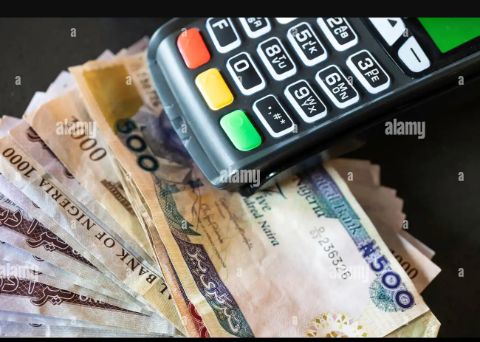Operators of Point of Sale, or POS, have taken on the role of the new lords as both new and old naira notes continue to be in short supply across the nation.
According to DAILY POST, many people stand in line for hours before bank Automated Teller Machines (ATMs), and some even fight, even though they have no chance of receiving cash.
Before the Central Bank of Nigeria’s (CBN) redesign of the N200, N500, and N1,000 banknotes, point-of-sale (POS) companies charged a set fee for dispensing various quantities of cash to clients.
Every N10,000 that was disbursed to customers came with a charge, which was typically N100. As the customer moved to higher sums, the charges increased in the same manner. This indicates that 10% of withdrawals over N10,000 are subject to a fee.
The majority of the time, discounts are offered to consumers who want to withdraw or deposit large sums. Depending on the POS operator, a withdrawal or payment of N100,000 can get a reduction and result in a fee as low as N700 or N800.
The earlier laxity and regulation that POS users were able to take advantage of, however, have been eliminated. This is because there is now no set fee for utilizing POS, as the availability of cash was previously more important.
There are no set fees associated with taking cash out of the POS, according to a Daily Post correspondent who traveled throughout Awka, the capital of Anambra State. Customers merely accept whatever commission the operators decide to charge, depending on the cash on hand.
While the majority of POS employees in the city claimed not to have cash on hand, some of them charged up to N4,000 for every N10,000 they were asked to pay.
“This N10,000 you want to take is my final payment. Miss Chidera Mmasi, a POS operator, told the Daily Post, “I’m only accepting to give it to you because you need cash.
While this was going on, POS operators at Eke Awka market, the largest market in the capital city, charged N1,000 for every N10,000 withdrawn. Since many vendors have stopped accepting transfers, there is a boom in every POS operator’s booth in the market, according to our correspondent who visited the marketplace.
“What is the sense of accepting transfers and when I want to buy products, I would still need a significant amount to withdraw the money,” a provision trader whose identity was unknown stated. Who is being duped? If I do it, I’ll lose the money I made from the products I sold. Therefore, let the customers be the ones to find the money, obtain it, and utilize it to make purchases from us.
I offer a plate of food for N1,000, said Miss Ifunanya Eze, a food vendor. I accept transfers, but you would have to pay N1,200 for a plate if you do so since I have to pay N200 as a service fee to get the money when I wish to buy food.
The lack of coordination in the fees asked by POS operators was criticized by a civil servant, Mr. Peter Ubaka, who talked to DAILY POST. He claimed that they were taking advantage of Nigerians because everyone needed cash.
“Today, just in front of me, a POS operator received the same N4,000 (four thousand Nigerian nairas) for every N10,000 and gave it to a man in exchange for N6,000. The cash on the POS operator’s register had run out when the man claimed to require the money. She only had N6,000, so when other people offered her N5,000, and N3,000, and the guy wanted N10,000, the POS girl insisted on charging them N4,000 instead because she didn’t have enough money to cover those amounts.
I was furious with the girl. Exploitative behavior. How did the roadside girls, who we used to contact to see if they had cash and dash-free money after deals, overnight become kings, with people gathering in their stands to wait for them every morning? I don’t comprehend. This needs to be looked at,” he raged.
The cash that POS operators are disbursing is also not simple to obtain, according to checks by DAILY POST, since many of them use atypical methods to obtain the cash. An examination revealed that many POS operators receive funding from a variety of sources to serve their clients and continue operating.
We visit banks and wait for customers to arrive to deposit money. We detain them, negotiate with them, send money to them, and finally pay out. There are still people who operate cash-based enterprises, a POS operator said.
Checks revealed that some of the POS operators also had agreements with fuel stations, meeting them there to collect their cash at the end of the day’s sales rather than allowing them to take it to the bank.
“That is how I have been getting cash to give to my personnel,” the POS agent said. However, a lot of people have taken it that way, making it tough to find money these days. Banks won’t give you anything, so if you go to an ATM, you’ll have to struggle for N10,000 or N20,000. It is challenging for everyone. We are only trying to survive, too.
However, President Muhammadu Buhari has pledged to investigate the CBN’s new naira notes policy and stop the suffering of Nigerians.
In conclusion, Nigerians may now again begin rejecting the old notes, as they did last week before the deadline was extended, which could worsen the situation as the February 10 deadline for the usage of the old notes approaches. This is assuming that the CBN does not further extend the deadline.











